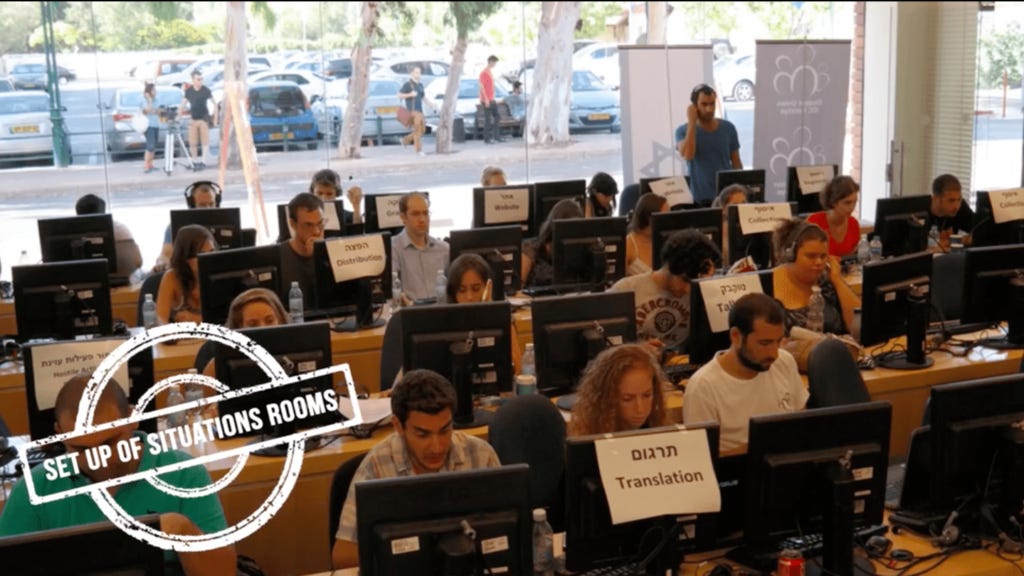Digital Zionist Supremacy: Inside Israel's Global Cyber Troll Army
How Israeli intelligence operations are censoring online anti-Israel dissent through mass propaganda campaigns
"World War III is a guerrilla information war with no division between military and civilian participation." —Marshall McLuhan
Whenever you argue online with a Zionist, there’s a good chance you’re engaging with an agent of the Israeli state.
As digital supremacy and military might are inseparable, Israel has engineered the most sophisticated and far-reaching digital propaganda operation in the world.
This comprehensive digital infrastructure extends far beyond government institutions in a mobilized global network that seamlessly blends civilians, students, and tech companies in what amounts to a distributed digital army, ringing true the words of McLuhan on an unprecedented scale.
Numerous well funded, organized projects by the Israeli Defense Force work to flood social media with pro-Israel propaganda, while censoring dissent against Israeli war crimes, an effort that has only accelerated since the October 7th Hamas attacks.
The projects utilize Israeli soldiers, students, American teens and others, and range from infiltrating Wikipedia, Reddit and 4chan to greatly influencing YouTube takedown policy.
The Command Center: Unit 8200 and Strategic Affairs
At the heart of Israel's cyber operations sits Unit 8200, the Israeli Defense Force equal to the NSA. Unit 8200 recruits thousands of "cyber warriors"—many of whom are still in their teens—and transforms them into hackers before they're old enough to legally drink.
According to Reuters, "Some of the operations it has allegedly been involved in include the 2005-10 Stuxnet virus attack that disabled Iranian nuclear centrifuges, a 2017 cyberattack on Lebanon's state telecoms company Ogero, and the thwarting of an ISIS attack on a civilian airliner traveling from Australia to the United Arab Emirates in 2018.1
After the October 7th Hamas attacks, the unit's commanding officer revealed to a conference in Tel Aviv that they used an AI system dubbed "Habsora" (the Gospel) to help select Hamas targets to bomb. A lecturer interviewed by NPR estimated these figures as 50–100 targets in 300 days for 20 intelligence officers, and 200 targets within 10–12 days for “the Gospel.”2
But the unit's influence extends far beyond its military origins. Its graduates have gone on to found or lead major tech companies operating throughout the United States and globally, including Check Point Software, ICQ, Palo Alto Networks, and CyberArk.3
This creates a global fortress of tech industry leaders with direct ties to Israeli military intelligence, effectively extending the its reach into the private sector.
Yet Unit 8200 is just one piece of a larger puzzle.
Israel's Ministry of Strategic Affairs has mobilized approximately $70 million to wage what they explicitly call "a war on consciousness terrorism" — their term for criticism of Israeli policies. The ministry's approach mirrors military operations, with the director, General Sima Vaknin-Gil, telling Israeli tech developers: "I want to create a community of fighters."4
This military mindset presides in the ministry's structure, which includes a special unit called Hama'aracha (The Battle) that operates a 24/7 operations room monitoring global activities related to Israel.
The JIDF and Covert Digital Operations
Before the emergence of more sophisticated digital influence operations, the Jewish Internet Defense Force (JIDF) pioneered many of the tactics that would later become standardized in Israel's cyber influence playbook.
As seen in leaked training videos and investigative reporting, a disturbing pattern emerged of systematic efforts to subvert online discourse through gaslighting and propaganda.
The JIDF developed a particularly concerning approach to recruitment and influence. Anyone who's paid attention to political comments sections on social media has noticed a pattern of user profiles displaying sports fandom, exclusively posting entertainment and sports content despite being actively engaged with political commentary in replies. Coincidentally, JDIF operatives are trained to create false connections with targets by feigning shared interests in sports teams, movies, or educational institutions.
This manufactured rapport served as a foundation for gradually recruiting unwitting normies into campaigns against groups arbitrarily deemed antisemitic.
Some cyber trolls were specifically trained to engage in personal attacks and systematic harassment of figures who expressed criticism of Israeli policies. The JIDF tactics combine a deceptive recruitment and targeted harassment to reshape online discourse, while simultaneously undermining public trust in authentic online interactions.
The Global Network: From College Campuses to Community Centers
What truly sets Israel's digital influence campaign apart is its extensive use of civilian infrastructure worldwide. The Act.IL project, a joint venture between Israel's IDC University, the Israeli American Council, and the Maccabee Task Force, has transformed this concept into a gamified mobile application. With over 12,000 users, predominantly in the United States, the app turns pro-Israel advocacy into a points-based game where users complete "missions" to counter criticism of Israel online.
These operations extend into physical spaces across America through a network of "media rooms." In Tenafly, New Jersey, high school students gathered in Jewish community centers to carry out social media missions in a coordinated human "botnet" from a command center in Herzliya, Israel.5
Similar operations run in Boston in cooperation with the Combined Jewish Philanthropies of Greater Boston, and more are planned for Manhattan, creating a network of civilian digital operators working in concert with Israeli objectives.

The Forward reports:
“In November, the Boston media room created a mission for the app that asked users to email a Boston-area church to complain about a screening there of a documentary that is critical of Israel. The proposed text of the email likens the screening of the film to the white supremacist riot in Charlottesville, Virginia, and calls the film’s narrator, Pink Floyd frontman Roger Waters, a ‘well-known anti-Semite.’”6
The Integration of Academia and Advocacy
Israel's digital influence operations have also made significant contributions to academic institutions worldwide. The National Union of Israeli Students' program demonstrates how effectively educational institutions can be integrated into state influence operations.
Students are organized into four specialized teams: Content, Wikipedia, Monitoring, and New Media, each with specific responsibilities in the digital space.7
The Content team focuses on creating original material in news format, while the Wikipedia team works on writing new entries and translating existing ones, actively manipulating online narratives about Israel.
The Monitoring team surveys social media platforms to identify and report content deemed antisemitic, and the New Media team manages social media channels in multiple languages.
The Jewish Agency website announces, as translated from Hebrew by Dena Shunra for The Electronic Intifada:
For the first time in Israel – a unique, world-encompassing scholarship, in cooperation between the Student Union and the Jewish Agency.
Every year the Jewish Agency of Israel sends approximately 150 emissaries to various places around the world - North America, England, South Africa, Australia, Germany, Italy and South America, who engage in Jewish education and hasbara in three main streams - Hillel emissaries (to campuses around North America), community emissaries and youth movement emissaries.
A 2012 report from The National Union of Israeli Students has further expanded this model, offering students $2,000 to work five hours weekly to "lead the battle against hostile websites."8 These students operated in specialized teams focused on content creation, Wikipedia editing, monitoring, and new media management. Working in 35 languages and representing 86 countries, the NUIS form a global network capable of responding to online criticism of Israel around the clock.
Corporate Collaboration and Platform Control
The effectiveness of these operations relies heavily on cooperation from major tech platforms, and Israel has secured unprecedented levels of compliance from major social media companies. In 2015, Israel's Deputy Foreign Minister met with YouTube CEO Susan Wojcicki and Google's Director of Public Policy, establishing what Israeli officials described as a "regular mechanism of control" over content.9

While Google disputed this characterization, subsequent reports indicate that Facebook, Google, and YouTube comply with up to 95% of Israeli requests to remove content the government finds objectionable.10
This high rate of compliance is facilitated by strategic placement of personnel within these companies. Facebook's Head of Policy in Israel, Jordana Cutler, previously served in the Israeli government, exemplifying the revolving door between tech platforms and Israeli state interests.11
The Israeli Justice Ministry's cyber unit reported success in removing 70% of targeted online content, demonstrating the effectiveness of these relationships.
A more recent report from Drop Site revealed the infiltration of Israeli operatives working inside Silicon Valley. "The data shows that Meta has complied with 94% of takedown requests issued by Israel since October 7, 2023. Israel is the biggest originator of takedown requests globally by far, and Meta has followed suit—widening the net of posts it automatically removes, and creating what can be called the largest mass censorship operation in modern history." The report continues,
Within Meta, several key leadership positions are filled by figures with personal connections to the Israeli government. The Integrity Organization is run by Guy Rosen, a former Israeli military official who served in the Israeli military’s signals intelligence unit, Unit 8200. Rosen was the founder of Onavo, a web analytics and VPN firm that then-Facebook acquired in October 2013. (Previous reporting has revealed that, prior to acquiring the company, Facebook used data Onavo collected from their VPN users to monitor the performance of competitors—part of the anti-competitive behavior alleged by the Federal Trade Commission under the Biden administration in its suit against Meta.)12
Strategic Funding and Resource Allocation
The financial backbone of these operations reveals their strategic importance to Israeli interests. The Strategic Affairs Ministry's $70 million budget includes several specific allocations: 22 million shekels for working with labor unions and professional associations abroad, and 16 million shekels focused on student activities worldwide.
Additionally, private funding plays a crucial role, with support coming from prominent figures such as casino billionaire Sheldon Adelson and hedge fund manager Paul Singer. This combination of state and private funding creates a robust financial infrastructure that ensures the sustainability and expansion of these digital influence operations.
The Future of Digital Influence
What emerges from this infrastructure is a new model of state influence that transcends traditional boundaries between government, military, civilian, and corporate sectors.
By mobilizing civilians worldwide through gamification, educational programs, and community centers, Israel has created a distributed digital army that operates around the clock across all major online platforms.
This approach represents a significant evolution in how states exercise power in the digital age. Rather than relying solely on centralized government agencies, Israel has successfully created a model where thousands of civilians voluntarily participate in coordinated digital campaigns, their actions guided by sophisticated software and intelligence operations.
The implications of this model extend far beyond Israel's immediate interests. As other nations study and potentially adopt similar approaches, the nature of online discourse and information flow could be fundamentally altered.
The line between organic online interaction and coordinated influence campaigns becomes increasingly blurred, raising crucial questions about the future of digital democracy and the nature of information warfare in the 21st century.
While Gaza is being actively decimated by Israeli bombs, Israel's information warfare complex exercizes its global dominance in the digital realm.

In this new landscape, the ability to mobilize civilians and control narrative spaces may prove as important as any conventional military capability. The success of this model suggests that future conflicts may be won not through traditional warfare, but through the dissemination of propaganda to subvert public perception and control information flow on a global scale.
Reuters. “What Is Israel’s Secretive Cyber Warfare Unit 8200?” Reuters, 18 Sept. 2024, www.reuters.com/world/middle-east/what-is-israels-secretive-cyber-warfare-unit-8200-2024-09-18/.
Brumfiel, Geoff. "Israel is using an AI system to find targets in Gaza. Experts say it's just the start". NPR. Archived from the original on 20 February 2024.
Marchall, Alexander. “What Is Unit 8200 and What We Know about the Israeli Army’s Technological Intelligence.” The Journal, Nov. 2024, uisjournal.com/what-is-unit-8200-and-what-we-know-about-the-israeli-armys-technological-intelligence/.
Itamar, Eichner. “Israel vs. Boycott Movement: From Defense to Offense.” 2021, archive.is/sn7ZT.
Nathan-Kazis, Josh. “Israeli App Makes American Jews Online Foot Soldiers.” 13 May 2024, archive.is/b8Iwl
“Shadowy Israeli App Turns American Jews into Foot Soldiers in Online War.” The Forward, 30 Nov. 2017, forward.com/news/388259/shadowy-israeli-app-turns-american-jews-into-foot-soldiers-in-online-war/.
Wikipedia contributors, "Media monitoring," Wikipedia, The Free Encyclopedia, https://en.wikipedia.org/w/index.php?title=Media_monitoring&oldid=1277720361 (accessed March 20, 2025).
“Israeli Students to Get $2,000 to Spread State Propaganda on Facebook….” 18 May 2021, archive.is/nngoI.
Weir, Alison. 2018. “How Israel and Its Partisans Work to Censor the Internet.” The Unz Review. March 8, 2018. https://www.unz.com/article/how-israel-and-its-partisans-work-to-censor-the-internet/.
Fortune Magazine, 2016 report quoting Israel's Justice Minister that "Facebook, Google, and YouTube are complying with up to 95% of Israeli requests to delete content."
LinkedIn profile and public records confirming Jordana Cutler's transition from Israeli government service to Facebook's Head of Policy in Israel.
Ahmed, Waqas, et al. “Leaked Data Reveals Massive Israeli Campaign to Remove Pro-Palestine Posts on Facebook and Instagram.” Substack.com, Drop Site News, 11 Apr. 2025, substack.com/home/post/p-161041203.






